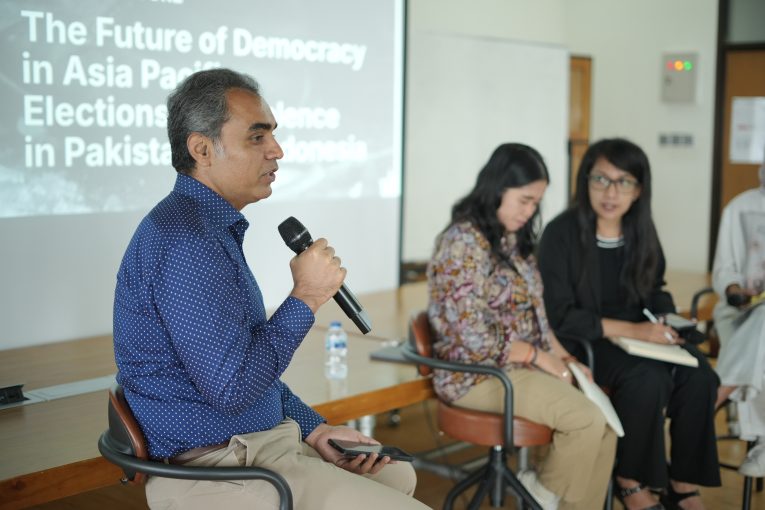
Yogyakarta, June 14th, 2024—The implementation of the 2024 elections is still a hot topic in various political expert discussions. Not only Indonesia, but several other countries are also implementing a year of political contestation. The Department of Politics and Government (DPP) held a DPP APMA MHRD discussion, Faculty of Social and Political Sciences (Fisipol) UGM, to discuss the future of democracy in the countries in the Asia-Pacific on Friday (14/6).
Hassan Nasir Misbahar, a Political Expert and APMA UGM Alumni was invited directly to explain his research on democracy in Pakistan which involves violence. Pakistan is one of the South Asian countries that implement a democratic government. Hassan said that Pakistan was once part of India. Internal divisions between Islam and Hinduism led Pakistan to separate itself. Some of the tribes that were the majority in Pakistan also moved, so currently the majority of the population are immigrants who are Muslim.
“This country has not had sufficient experience implementing democracy, even though they are one of the British colonies. This is one of the reasons why their democracy is still very weak, even involving violence,” said Hassan. He explained the condition of Pakistani society every election year. Pakistan has experienced difficult times for years with dictatorial rule. Not all people can freely cast their votes in elections.
Several studies conducted on Pakistani democracy stated there was a series of conflicts between election participants. “Pakistan is a country controlled by several big parties. They have their political territory, which often causes conflict. One party and another are never in the same area,” said Hassan. Moreover, with Pakistan’s military strength, the use of violence in elections has become commonplace.
Even though Indonesia has shown a decrease in violence in elections, this does not mean that democracy is running smoothly without violence. Sri Surani, a Member of the Yogyakarta General Election Commission (KPU), said that a lot of violence was still occurring in the 2024 election. She divided violence in this case into physical and non-physical violence. This violence against democracy is interpreted as the many attempts to violate the rules by election participants.
“Indonesia is the largest elections organizer in the world, we alone have 11.000 KPPS. Many conflicts were still going on until the last election, such as the destruction of party billboards and the use of public facilities which were not permitted by the authorities,” she explained. The conflict occurred as a result of a struggle for the party’s territory. This phenomenon is almost the same as what happened in Pakistan.
Rani added that the implementation of elections so far has always resolved year-old problems, namely attempts to violate election rules. “Perhaps physical violence has decreased, but violations of the rules still exist, one of which is money politics,” she said. It is common knowledge that the practice of money politics increases drastically even a year before the election is held. Rani also thinks that the current law has not fully resolved this problem.
The discussion entitled “The Future of Democracy in the Asia Pacific: Election and Violence in Indonesia and Pakistan” provides a big picture of how democracy in the Asia-Pacific needs special attention. Every citizen’s right to vote must not be obstructed, limited, or even taken away just for the benefit of certain parties. The hope is that this discussion will also be a form of contribution from the Faculty of Social and Political Sciences UGM to strengthen peace, justice, and institutions as stated in the 16th point of the Sustainable Development Goals (SDGs).
